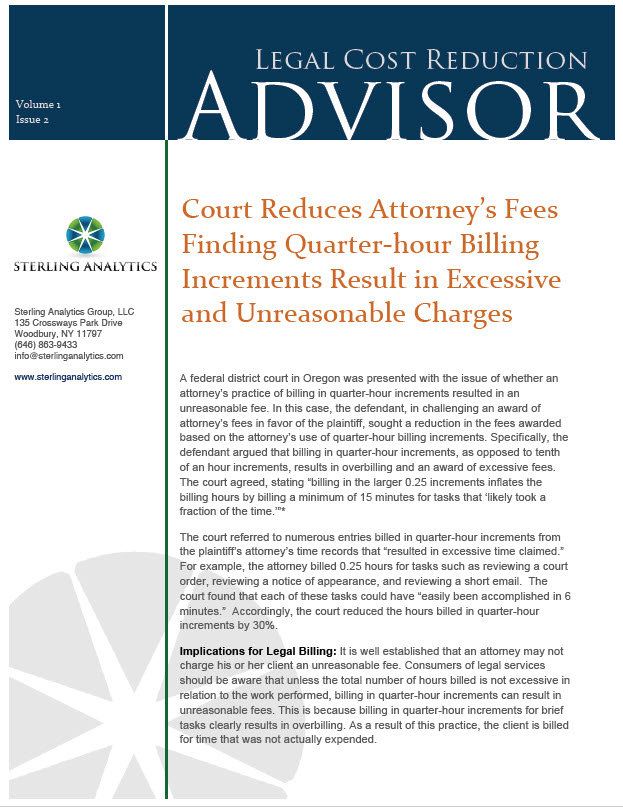A federal district court in Oregon was presented with the issue of whether an attorney’s practice of billing in quarter-hour increments resulted in an unreasonable fee. In this case, the defendant, in challenging an award of attorney’s fees in favor of the plaintiff, sought a reduction in the fees awarded based on the attorney’s use of quarter-hour billing increments. Specifically, the defendant argued that billing in quarter-hour increments, as opposed to tenth of an hour increments, results in overbilling and an award of excessive fees. The court agreed, stating “billing in the larger 0.25 increments inflates the billing hours by billing a minimum of 15 minutes for tasks that ‘likely took a fraction of the time.’”*
The court referred to numerous entries billed in quarter-hour increments from the plaintiff’s attorney’s time records that “resulted in excessive time claimed.” For example, the attorney billed 0.25 hours for tasks such as reviewing a court order, reviewing a notice of appearance, and reviewing a short email. The court found that each of these tasks could have “easily been accomplished in 6 minutes.” Accordingly, the court reduced the hours billed in quarter-hour increments by 30%.
Implications for Legal Billing: It is well established that an attorney may not charge his or her client an unreasonable fee. Consumers of legal services should be aware that unless the total number of hours billed is not excessive in relation to the work performed, billing in quarter-hour increments can result in unreasonable fees. This is because billing in quarter-hour increments for brief tasks clearly results in overbilling. As a result of this practice, the client is billed for time that was not actually expended.
It is important to note that quarter-hour billing does not universally result in excessive hours or unreasonable fees. Some entries billed in quarter hour increments may occasionally be more accurate than tenth of an hour billing increments. For example, a 15-minute task would be billed as .25 when using quarter-hour increments, versus .30 when using tenth of an hour increments. But when an entire year’s worth of legal bills are analyzed as a whole, the overbilling that typically results is much more drastic when using quarter-hour increments, since 5-minute tasks, for example, are billed as .10 when using tenth of an hour increments, versus .15 when using quarter-hours. Simply stated, the higher the minimum billing increment at which a client is billed, the more likely that client will be overcharged.
When utilizing any minimum billing increment, it is inevitable that some overbilling will result. Consumers of legal services should recognize this problem and require use of the more accurate .10 billing increments, as well as be vigilant about frequently auditing attorney bills.
Most retainer agreements state the billing increment at which the client will be billed. Consumers of legal services should take notice of this provision in their agreements with legal counsel and should not ignore the significant difference between .10 and .25 billing increments. The difference can amount to a considerable sum of money, especially at large corporations that spend hundreds of thousands or even millions of dollars in legal services every year.
*Brandt v. Astrue, 2009 WL 1727472 (D. Or. 2009). Full copies of court decisions may be available through counsel or through various Internet links or paid services.
By Laura R. Bugdin


